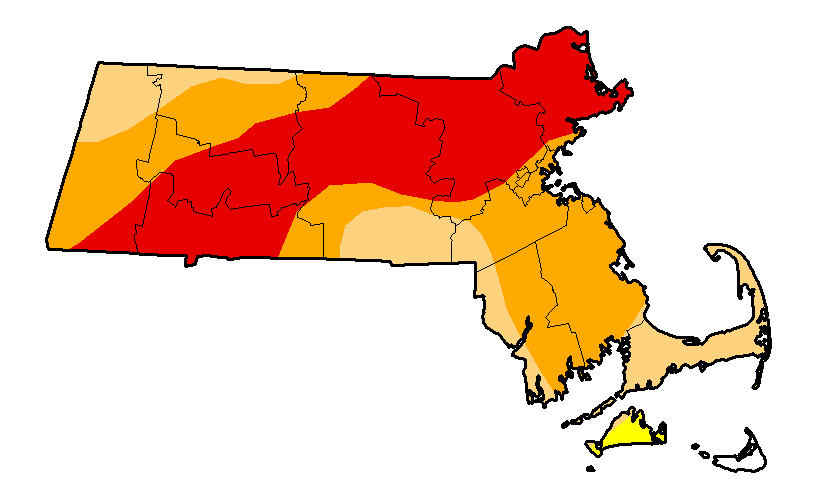
MA drought map updated December 13, 2016. The area in red, about one third of the state, is in an Extreme Drought condition.
What do you do keep your drought-stressed plants alive this winter? It’s hard to put a Band-Aid on drought-stressed plants, but here are some things you can do:
- KEEP WATERING UNTIL THE GROUND FREEZES IN THE FALL/EARLY WINTER. Check with your city or town to see if even now, in late December, there’s a current watering ban. Especially with new plantings, and also with drought-stressed ones, you generally want to give them the equivalent of one inch of water per week all the way until the ground freezes. If time or water is limited, focus on watering your most valuable plants, such as trees and shrubs.
- IMPROVE YOUR SOIL. On your lawn for instance, just 1/4 inch of compost every fall makes a huge difference in the resilience of your turf plants. For your planting beds, pull back the mulch, spread 1/2 inch of compost or leaf mold, scratch it into the soil surface, and put the mulch back in place. This will increase the soil’s ability to hold moisture and make nutrients more available to the roots of your plants. Think in terms of feeding your soil (the soil food web), not feeding your plants.
- MULCH. It’s not to late to apply 2-3 inches of mulch to all areas of exposed soil. Do not let mulch come in contact with the trunks of your trees and shrubs, where it transitions into the root. This area is called the root flare and should never be covered. If you see a mulch volcano around the base of a tree, the mulch is suffocating the tree, which stresses it, makes it vulnerable to pests and pathogens, and puts the tree on a path of decline. About the best mulch of all is fallen leaves that you’ve chopped up with your lawn mower and spread on your beds. Speaking of chopped leaves, you can also pile them up, adding water to create a water film on most of the leaf surface area, and let them sit for a year or two. The result, called leaf mold, is another source of organic matter that will make your plants sing.
- PLANT NATIVES. Many people picture native plants as being weedy and leggy. In fact, native plants are best adapted to not only survive, but thrive in the existing environmental conditions. Test your soil and know how much sun your planting site gets. Then, it’s easy to select plants that should do quite well with minimum inputs, once established.
For more info about the drought status in MA, visit http://droughtmonitor.unl.edu/Home/StateDroughtMonitor.aspx?MA
Please follow and like us:
